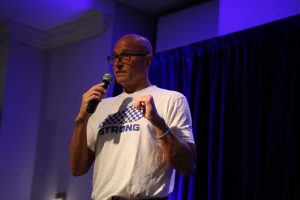By Jacqueline Pitts, The Bottom Line
LEXINGTON, Ky. — Kentucky business leaders gathered in Lexington to hear personal stories of addiction as well as expert discussions about how employers can help solve the opioid epidemic at the Kentucky Chamber’s inaugural Kentucky Opioid Summit.
Opening the summit, Kentucky Chamber President and CEO Dave Adkisson said the business community wants to be a part of turning the tide on the state’s opioid epidemic by getting people back on track and back to work, which benefits the individual, their families, and the community.
Adkisson stressed the importance of treatment and added when employers take a stand against the stigmas surrounding the struggles of addiction, it sends a clear message to employees and others that businesses are committed to being a part of the solution.
Personal Stories of Addiction

UK basketball star Rex Chapman shared his personal story of addiction. Following his career at the University of Kentucky, Chapman played 12 years in the NBA. Toward the end of his professional basketball career, he had undergone seven orthopedic surgeries and then an emergency surgery during his final season. After that surgery, he was given an Oxycodone prescription.
In describing this experience, Chapman said he knew he was “in love” with the drug after just two days of taking the medication. Because the drug made him feel numb, Chapman said he felt more approachable and preferred this version of himself.
Chapman’s addiction reached a point where he was taking 40 Vicodin and 10 Oxycodone per day before he went to treatment for the first time. While it took him two more stints in treatment to get off all medications, Chapman has been in recovery for five years and is now using his story to help others.
In a moving personal testimonial, Patrick Kullman explained to attendees he worked a job with a lot of physical labor and was hurt badly on the job and was prescribed pain pills as a result. He continued to use the pills until the prescription ran out and he began to ask around to find more.
Kullman stated he then became a heroin addict as a result, which he stated was a simple math problem when the cost of escalated use of the pills reached $70 a day and someone told him he could get the same high with heroin for $5. He said his issues with abuse continued to get worse until he attempted to commit suicide. Following that suicide attempt, Kullman decided to take treatment seriously and has now decided to use his experience to help others struggling with addiction by assisting them find the right type of treatment for them.
Pat Fogarty, the director of community relations at Alkermes, closed the summit with his personal story on Monday. Fogarty stated addiction took him to dark places including incarceration, overdose, loss of close relationships, and more. He joked he is the only guy in corporate America that has also worked prison laundry.
In discussing key aspects that helped him get back on his feet, Fogarty stressed the importance of treatment and employment in recovery as well as transitional living.
The Opioid Epidemic in the Workplace: How Employers Can Respond
In the opening keynote address, Executive Director of the Grayken Center for Addiction at Boston Medical Center Michael Botticelli, who also served as director of National Drug Control Policy under the Obama Administration and has personally experienced substance use disorder, examined the opioid epidemic and how it impacts the workplace.
Botticelli stressed that people struggling with addiction often don’t seek help because they are afraid of what their employer will think and the negative impact it may have on their job. Botticelli added it is important to build a culture where people feel more comfortable coming forward and asking for help because often individuals don’t say anything until it is too late. For Botticelli personally, it wasn’t until he was arrested that he finally asked for help.
When discussing other impacts of the opioid crisis on the workplace and how employers can respond, Botticelli stated the cost of addiction treatment for employers has continued to rise as many employers often don’t know what is the most effective treatment and tend to choose expensive out of state, out of network treatment as a result. Moving forward, Botticelli pointed to changes being made by Boston Medical Center as an employer including updating policies to take a more sympathetic approach when it comes to drugs and alcohol, implementing substance abuse training for managers, and making resources more ways available to begin to change the culture within a company and help solve the issue.
The History and Future of the Addiction Epidemic in Kentucky
The opioid crisis is not the first drug epidemic Kentucky has faced. But as for how we got here, Kentucky Office of Drug Control Policy Executive Director Van Ingram explained the opioid crisis came as a perfect storm as the way pain was treated in America changed while sales and advertising of opioids by Perdue Pharma was at an all-time high.
Ingram said it is key for Kentucky to change the culture surrounding the issue, using the example that years ago there would have been ashtrays at each table but the culture around smoking has been changed. In order to start this shift, Ingram noted the Bevin administration has worked to implement a 3-day limit on opioid prescriptions and other efforts.
Dr. Katie Marks, project director of the Kentucky Opioid Response Effort under the Cabinet for Health and Family Services, stated it is important to create a recovery-oriented system of care which supports long-term recovery of individuals and creates a culture that supports an individual’s recovery with the principles of availability, accessibility, acceptability, and quality.
Addiction Epidemic in Kentucky: Opportunities for Success
A panel of experts including leaders from Anthem, LG&E, and the automotive industry discussed the opportunities that exist with the crisis and how success can be achieved.
Eric Bailly, business solutions director for Anthem, said the opioid crisis is absolutely a workplace concern as 70% of those with substance use disorder are employed. Bailly added that the costs to businesses come as a result of lost time, turnover and retraining, and medical expenses. To help address the issue for both employers and employees, Bailly encouraged businesses to take actions including increased awareness, implementing a prescription drug use policy, encouraging use of assistance programs and medical health options, and education on safe use as well as disposal of prescription medications in order to stamp out the stigma surrounding the issue.
LG&E Corporate Health and Wellness Leader Amanda Elder stressed it took a long time for the country to end up in this crisis and it will not be turned around over night but it is critical for employers to begin the conversations and start taking the right steps.
Jamie Johnson, director of operations at Dorman Products, shared his personal reasons for wanting to work toward helping those struggling with addiction from the employer perspective as he stated his family adopted a young girl who is one of seven children from a family with parents with addiction issues. Johnson said after seeing this struggle first hand and wanting to help, his company implemented a plan to fight back called SPAR—support, prevention, attention, and reach.
Recovery-Friendly Workforce Announcement
At the summit, the Kentucky Chamber announced Opioid Response Program for Business, which will be led by a task force of business and industry representatives. The program will work directly with employers to help audit their policies and recommend best practices to maintain a drug-free workplace while supporting a recovery-friendly culture. It will focus on destigmatizing the addiction epidemic and supporting employers’ role in opioid prevention, treatment and recovery in the workplace. Learn more about the new program and a report released Monday on The Bottom Line here.
Former Kentucky Gov. Ernie Fletcher on Efforts of Recovery Kentucky
In the luncheon keynote address, former Kentucky Governor Ernie Fletcher detailed his work with Recovery Kentucky to help those seeking treatment and looking to get back on track.
Recovery Kentucky, started by the late Don Ball in 2004, was created to help Kentuckians recover from substance abuse. There are 14 Recovery Kentucky centers across the Commonwealth which provide housing and recovery services for up to 2,000 Kentuckians simultaneously across the state.
Gov. Fletcher illustrated the fact that the people with substance use disorder are not who we often think they are. He invited Michael St. John, a Kentuckian who has gone through treatment with Recovery Kentucky, to tell his story.
St. John described his struggle with addiction and his experience with the Hope Center in Lexington where he received free treatment and was hugged and told his life was worth living when he walked in the doors. He stressed that those with substance use disorders are not bad people but instead are people trying to get well. Because of his treatment, St. John told the crowd he is now employed, a taxpayer, and has a purpose because of people and groups like those in the room committed to making a difference on this issue.
Opioid, Drug, Substance Abuse in the Workplace: What is it Costing Kentucky Business?
Jenny Burke, senior director of advocacy at the National Safety Council, explained while many companies want to do something about helping employees with addiction struggles, only 2 in 5 businesses are taking real actions to combat the opioid crisis.
Burke stated 10% of Americans live in recovery but only a small amount of people are actually getting treatment. She stressed employers need to create a supportive workplace for people to come back to and pointed to data that shows employees are more loyal and miss less time when employers demonstrate supportive efforts in the workplace.
To help employers understand the need for change, the National Safety Council has created a substance use cost calculator to put real numbers in front of employers to show the cost to their bottom line when it comes to substance use disorder. Burke said it is important for companies making changes to share their stories and polices because many businesses are uncertain on how to help and don’t know how to get started.
The Law Enforcement Perspective
U.S. Attorney Russell Coleman started his remarks with a joke that his title doesn’t quite line up with the others on the Kentucky Opioid Summit Agenda as he is on the government and law enforcement side. Coleman stressed the importance of law enforcement in solving this crisis and added while the state can’t arrest its way out of this issue, it also cannot simply treat and/or prevent its way out of the issue. He stated it is key to see the solution as a three-legged stool which includes treatment, prevention, and enforcement.
Coleman discussed the struggles of a lack of collaboration and the limitation it presents in order to counter the threat to the state’s workforce, families, and individuals when it comes to this crisis. He added businesses and providers are uniquely positioned to scale up efforts of prevention but asked the crowd to remain mindful of the role that law enforcement must play in these discussions.
Leveraging Science to Improve Outcomes for Individuals with Substance Use Disorder
Dr. Sharon Walsh, director of the Center on Drug and Alcohol Research at the University of Kentucky, illustrated the need for evidence-based treatment for opioid use disorder and why it is critical to incorporate proven medications in treatment.
Walsh pointed to methadone, buprenorphine, and naltrexone as the three primary medications used to treat opioid use disorder and added that while some are against medication-based treatment for recovery, she stated opioid use disorder is a chronic relapsing brain disorder and medication is needed. She added it is not trading one medication for another because there is a big difference between addiction and physical dependence, which is a change in homeostasis to feel normal and now those receptors must be occupied,–what the medication helps to do.
Less than 1 in 10 individuals with opioid use disorder, Walsh said, are offered evidence-based care because there of a lack of sufficient providers, costs, insurance restrictions, stigma and outright discrimination, and lack of understanding about how medication works. Walsh stressed the importance of education on this issue and the importance of medically assisted treatment.
Sharing Solutions: Business’ Role in Combatting the Opioid Crisis
A panel of employers, an educational group, and a drug enforcement administration (DEA) agent discussed the efforts they are engaging in in order to ensure reduction and prevention of opioid misuse.
After seeing many failed drug tests from potential hires and employees, Belden, a manufacturer of networking, connectivity, and cable products, decided to take a different approach. The company now, after a failed drug test, has a discussion with the individual and offers them free treatment if they are willing and then evaluate them as a candidate for a job and potentially places them in a safe position for 18 months before looking at advancement.
Christopher Evans, a DEA agent out of Louisville, said he has never seen a drug threat as large as the one presented by opioids in his 26-year career. Evans, like U.S. Attorney Russell Coleman, stressed the importance of collaboration between law enforcement, companies, government, health care, and others.
Discovery Education is working on a campaign to encourage parents to begin discussions with children about what opioid misuse is and what it looks like in order to reimagine the education experience. Discovery Education’s Operation Prevention also seeks to educate the future workforce in order to increase prevention.
The U.S. Chamber Foundation’s effort, Sharing Solutions, bringing together all resources for employers and others was also highlighted in the panel as a way to combat the opioid epidemic in the workplace and the community.
Next Steps
The Kentucky Chamber plans to continue its efforts to help the business community to get involved in solving the opioid crisis through its work with the new Opioid Response Program for Business and the Opioid Response for Business Task Force.





















Add Comment